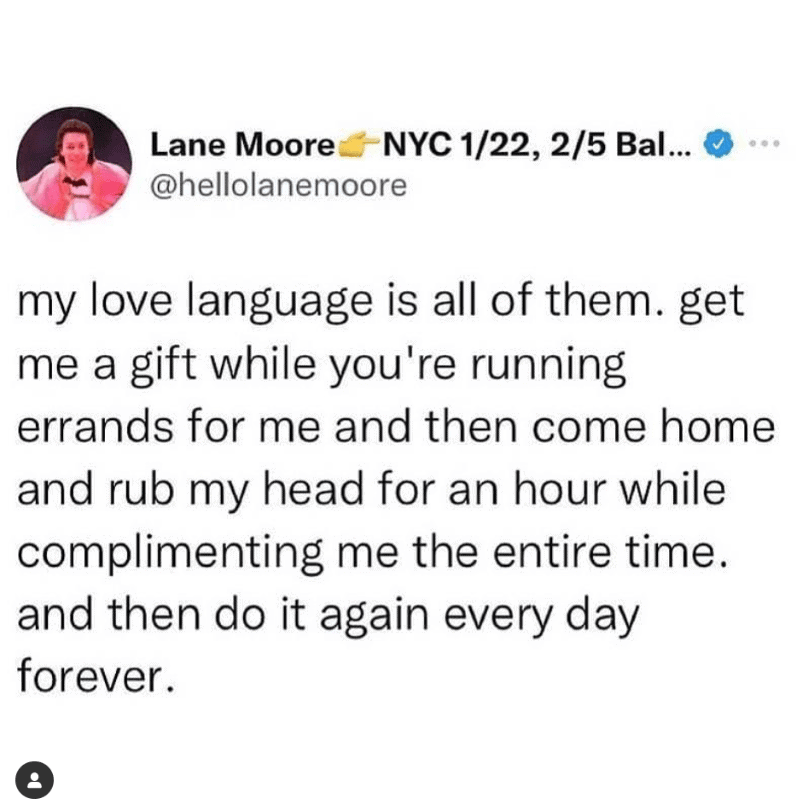On Love Languages 💖💕
“Talk to me in your love language
Show me, yeah, how to connect to you
Help me understand
How you speak your love language”
-SZA
Love languages have been around for over thirty years now, and have gained a lot of traction in the past ten years with the explosion of social media. The concept of love languages was coined by Dr. Gary Chapman, who is an author and a speaker. He wrote the book “The Five Love Languages: How to Express Heartfelt Commitment to Your Mate” in 1992. The idea behind love languages is that each person receives and gives love in unique ways, specific to them. One might give love one way, and receive love in a different way. By identifying one’s own love language, and that of their partner and/or loved ones, they can connect to others more closely. Love languages can be applied to not only romantic partners, but to friends and family members, including children.
To this end, there are five love languages: words of affirmation, physical touch, acts of service, receiving gifts, and quality time.
love language meme
The “Time to Lean” podcast recently aired an episode called “What if love languages are bullshit?” On it, one of the podcast hosts, Crystal, chatted with Michael Vaughn (@world.shaker) about where the idea of love languages came from, the creator of the theory, and how they are potentially damaging to romantic relationships. I’ve been thinking about the podcast episode for a few weeks now, and wanted to share some thoughts prior to the upcoming international day of love, Valentine’s Day.
Their first criticism is that while Chapman has a doctorate degree, it is in adult education, not in any clinical field. While making space for the validity of Chapman’s degree, the two argue that while working with couples in the therapeutic space, the misrepresentation of one’s credentials is problematic. Dr. Chapman is also heavily involved in the evangelical church, which influences the couples (heterosexual, monogamous) he studied in order to develop his theory. In fact, much of Chapman’s work is anecdotal, with no research-based claims to back the theory of love languages. So in a sense, the concept of love languages is in tandem with other pop psychology myths such as power posing and The Myers-Briggs test - helpful, but not empirically evidence-based.
The two posit that due to homophobic blog posts on his website, and a victim-shaming chapter in his book, Chapman upholds dangerous, patriarchal values that routinely ask women to change their behaviors for their husbands in order for their relationships to work. This often looks like women sacrificing their own needs for boundaries, rest, and alone time in order to satiate their partner’s desire or need for sex, or physical touch (the number one love language for men). Further, Crystal and Michael discuss one chapter of the book where Chapman describes what is clearly emotional abuse and offers the advice to turn the other cheek.
Crystal and Michael also argue that someone knowing their partner’s love language doesn’t absolve them from showing care and affection in other ways appropriate to their partner’s needs at any particular time. Love languages can rob people (particularly men) of the opportunity to feel and express vulnerability.
As a clinician, I have heard about love languages for years, and have even found it to be a useful resource for clients and personal contacts. These new learnings about Chapman’s viewpoints have given me pause, however, because I find it challenging to recommend and perpetuate an idea that stems from bigoted ideologies.
The podcast hosts offer alternative resources to folks, including The Gottman Institute, which is an organization dedicated to strengthening relationships through an evidence-based approach.
I also believe the work the Gottmans have done is wonderful and helpful. It, alongside doing the work to develop a stronger sense of self-love, can be excellent tools used to develop stronger, healthier relationships with your partner and other loved ones.
In All About Love, author and educator bell hooks writes “communities sustain life - not nuclear families or ‘the couple,’ and certainly not the rugged individualist.” She goes on to write “loving friendships provide us with a space to experience the joy of community in a relationship where we learn to process all our issues, to cope with differences and conflict while staying connected.”
In this sense, community is a balm. Connecting with loved ones in ways that encourage empathy and active listening create opportunities for learning about others and ourselves. Though checklists and quizzes may be helpful, they’re limiting. Intentionally deepening our relationships with others through community, familial, platonic, and romantic partnerships allows for expansion, constantly prompting growth.
While Honey Bee Therapy doesn’t (yet) offer couples counseling, one of my specialties is working with individuals in relationships. Use this link to schedule a consultation for us to learn more about each other and to get you on the path to stronger self love that can then be translated to loving others more appropriately.


